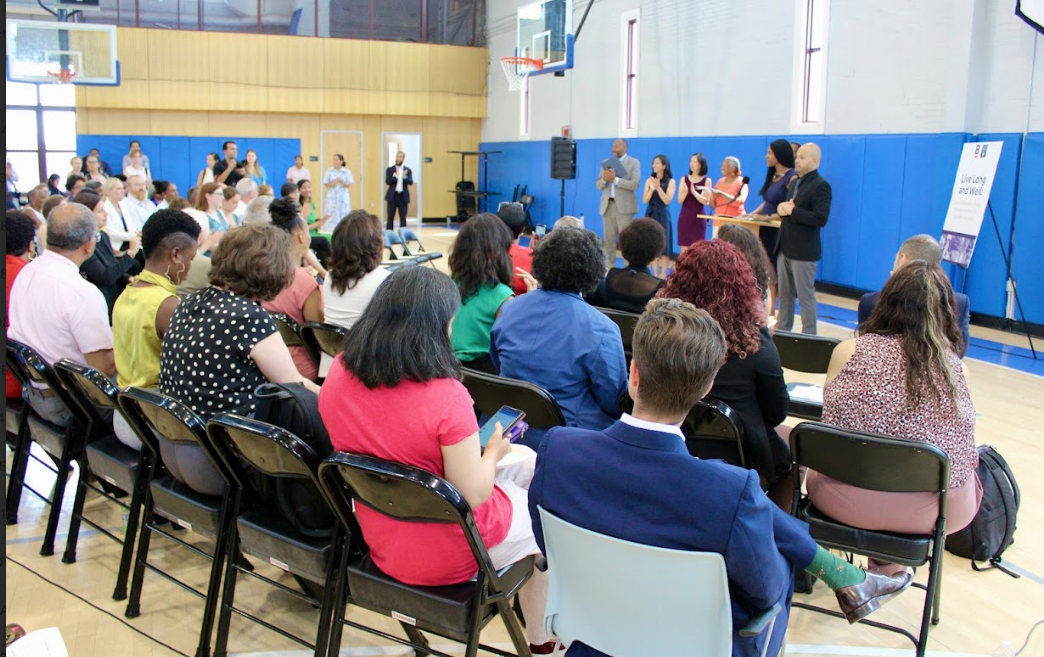July 11, 2024

From left: Dr. Ann Hwang, president of Atrius Health Equity Foundation, BPHC executive director Dr. Bisola Ojikutu, and Mayor Wu. Cassidy McNeeley photo
Mayor Wu and her administration’s public health leaders unveiled their latest plan to combat a disturbing gap in life expectancy rates across Boston’s neighborhoods on Wednesday in front of about 75 people who gathered inside a city-owned gymnasium in Roxbury. The event was a follow-up to a Boston Public Health Commission (BPHC) study last year that detailed that gap— and the health disparities that officials say are to blame.
Where we stand and sit today is just steps away from the area in Boston with the lowest life expectancy,” said Dr. Bisola Ojikutu, executive director of BPHC. “Last year around this time we reported that someone born in that area has an average life expectancy of 69 years of age compared to someone born in an area of Back Bay and they have a life expectancy that’s 23 years higher, 92 years of age.”
Her agency’s latest attempt at combating that huge gap is called “Live Long and Well,” a campaign that Bisola and Wu characterize as a multi-agency partnership between the City, BPHC, Boston Community Health Collaborative (BCHC), and Atrius Health Equity Foundation, which is helping to fund it.
The overall life expectancy in Boston has risen to 82 years of age, which is higher than the life expectancy rate pre-Covid and relatively high compared to the rest of the country. So how is the average life span in the city growing while the gap between neighborhoods stays stagnant?
Ojikutu says it’s mainly social determinants.

The scene inside the BCYF Vine Street Center's Terrence Clark gymnasium on Wed., July 10. Cassidy McNeeley photo
“The root cause of these issues isn’t within the walls of our health care system. It’s really about social determinants of health and issues like economic mobility, access to economic opportunity, wealth building, housing, affordable and nutritious food, all of the things our residents should have access to,” Ojikutu said inside the Terrance Clarke Gymnasium at BCYF Vine Street Community Center. “Our goal, and certainly the goal of Mayor Wu, is that every Bostonian leads a long and healthy life,” Ojikutu stated at the podium.
She added: “This agenda outlines goals for a healthier Boston and describes our deep commitment to achieving those goals with a focus in [these] areas: diabetes and high blood pressure - cardiometabolic diseases, drug overdoses, and preventable cancers.”
While these are the main causes of early mortality across the city, Mayor Wu reminded those at the press conference that their health is also impacted by social, economic, environmental, and structural factors.
“Everyone in this room knows there’s so much more to health than just knowing the services and institutions exist somewhere in the city. We need to make sure that everyone has access,” said Mayor Wu. “There is so much more to health than the care that we receive when something is already going wrong. Some of the biggest influences on our health depend on the circumstances and surroundings that we’re born into, grow up in, and grow old in.”
Wu added: “The difference between Back Bay and Roxbury isn’t just distance. It’s income, it’s park and green spaces, it’s access to healthy affordable food, education, and opportunity. Our health equity agenda is designed to take these gaps on directly and to build on all the work that is already happening across Boston so we can truly be a city where every family is flourishing.”
Wu also invited various partners and leaders to share their thoughts on the initiative including, Dr. Ann Hwang, president of Atrius Health Equity Foundation, Dr. Michael Curry, president and CEO of Massachusetts League Community Health Centers, and Mattapan community activist Vivien Morris.
After the event ended, The Reporter caught up with Dr. Ojikutu to see how Live Long and Well will impact Dorchester and Mattapan in particular.
She shared the following: “We oftentimes talk about the 23-year life expectancy gap between an area of Roxbury and Back Bay but there are pockets of relative disadvantage and lower life expectancy throughout our city and certainly Dorchester as a neighborhood has a lower life expectancy than other areas and has areas where life expectancy is not where we would like it to be.”
Ojikutu added, “Funding like this is not just directed to one neighborhood, it’s a city-wide initiative so we are hoping we have city-wide investments that will be made around our city that will impact residents’ lives significantly.”


